重点单词讲解
- 格式:doc
- 大小:33.00 KB
- 文档页数:2
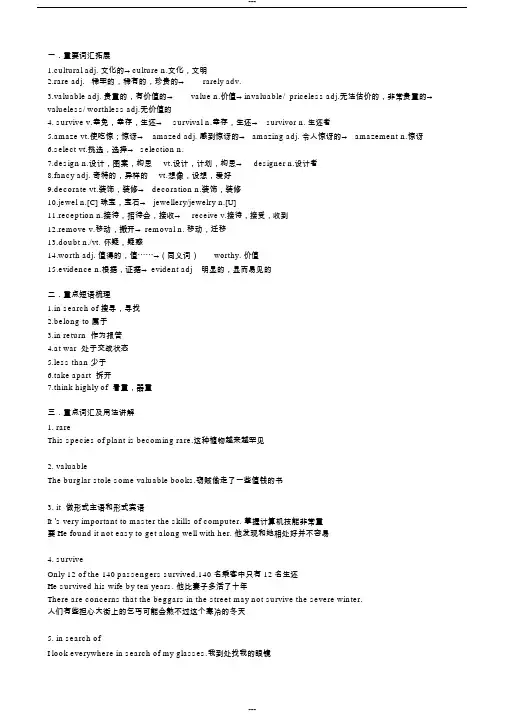
一.重要词汇拓展1.cultural adj. 文化的→ culture n.文化,文明2.rare adj.稀罕的,稀有的,珍贵的→rarely adv.3.valuable adj. 贵重的,有价值的→value n.价值→ invaluable/ priceless adj.无法估价的,非常贵重的→valueless/ worthless adj.无价值的4. survive v.幸免,幸存,生还→survival n.幸存,生还→survivor n. 生还者5.amaze vt.使吃惊;惊讶→amazed adj. 感到惊讶的→amazing adj. 令人惊讶的→amazement n.惊讶6.select vt.挑选,选择→selection n.7.design n.设计,图案,构思vt.设计,计划,构思→designer n.设计者8.fancy adj. 奇特的,异样的vt.想像,设想,爱好9.decorate vt.装饰,装修→decoration n.装饰,装修10.jewel n.[C] 珠宝,宝石→jewellery/jewelry n.[U]11.reception n.接待,招待会,接收→receive v.接待,接受,收到12.remove v.移动,搬开→ removal n. 移动,迁移13.doubt n./vt. 怀疑,疑惑14.worth adj. 值得的,值⋯⋯→(同义词)worthy. 价值15.evidence n.根据,证据→ evident adj明显的,显而易见的二.重点短语梳理1.in search of 搜寻,寻找2.belong to 属于3.in return 作为报答4.at war 处于交战状态5.less than 少于6.take apart 拆开7.think highly of 看重,器重三.重点词汇及用法讲解1. rareThis species of plant is becoming rare.这种植物越来越罕见2. valuableThe burglar stole some valuable books.窃贼偷走了一些值钱的书3. it 做形式主语和形式宾语It ’s very important to master the skills of computer. 掌握计算机技能非常重要 He found it not easy to get along well with her. 他发现和她相处好并不容易4. surviveOnly 12 of the 140 passengers survived.140 名乘客中只有 12 名生还He survived his wife by ten years. 他比妻子多活了十年There are concerns that the beggars in the street may not survive the severe winter.人们有些担心大街上的乞丐可能会熬不过这个寒冷的冬天5. in search ofI look everywhere in search of my glasses.我到处找我的眼镜He went to the south in search of a better job. 他去南方寻找更好的工作6. amazeYour great progress will amaze everyone.你的巨大进步会让每个人吃惊My younger sister has an amazing talent in dance. 我妹妹在舞蹈方面有惊人的才华 We were amazed to find that no one was hurt. 我们很惊异的发现竟没有人受伤7. selectI selected four postcards and handed them to the cashier.我挑选了 4 张明信片,递给收银员Some changes have been made to the computer’s basic design计.算机的基本设计有了一些改变8. designA local engineer designed the theatre.一位当地的工程师设计了这座剧院 The course is designed for beginners.这门课程是为初学者设计的The programme is designed to help people who have been out of work for a long time.这项计划的目的是为长期失业者提供帮助9. decorateWe decorated the christmas tree with lights. 我们用灯来装饰圣诞树I ’m going to decorate the bathroom next.接下来我要装修浴室10. belong toThose books belong to me.那些书是我的11. in returnYou gave me your watch and in return i gave you my book. 你把手表给我了,作为回报,我把书送给你I sent him a present in return for his help 我送给他一份礼物以答谢他的帮助 .12. have sth doneI want to have my bicycle repaired 我想找人修理我的自行车.The boy had his clothes washed.这个男孩让别人给他洗衣服13. less than no less than not less thanI drank no less than ten bottles of beer.我喝了多达10 罐啤酒It ’s not less than a mile to the station.到火车站至少有一英里路14. doubtDoubt is the key to the knowledge.怀疑是知识的钥匙There is no doubt that he will come back. 毫无疑问,他会回来的I have some doubt whether my sister can be admitted to a university.I doubt whether/if he will keep his promise.I don ’t doubt that he will keep his promise15. formerCompared with the former student, the latter one is more fluent in spoken English.和前一个学生相比,后者的英语口语更流利16. worthThe museum is well/really worth a visit. 这家博物馆很值得参观It ’s worth taking your time when your visit the church. 你值得花时间参观这座教堂17. apartWe are living apart now. 我们现在不住在一起It ’s easy to take the watch apart but difficult to put it together again. 拆开手表很容易,但要再装起来就难了Apart from their apartment in Beijing, they ’ve got a house in country.除了北京的公寓,他们在乡下还有一栋房子18.“疑问词 +不定式”结构做主语,宾语,表语等How to do it is a question.怎样做是一个问题I don ’t know which book to choose.我不知道应该买哪一本书My question is how to carry out the plan. 我的问题是怎么实施这项计划19. evidenceWe found further scientific evidence for this theory. 我们找到了进一步证实这种理论的科学依据There is some evidence that a small amount of alcohol is good for you.有证据显示,少量饮酒有益健康20. explodeThey had planned to blow up the bridge but their bombs failed to explode.他们原本计划炸掉这座桥,但炸弹没有爆炸21.think highly/ much/ well/ a lot/ little/ poor/ badly of ; speak highly/ wellof She thought highly of him and his novels.她很看重他和他的小说He seemed to think highly of you. 他好像对你评价很高。
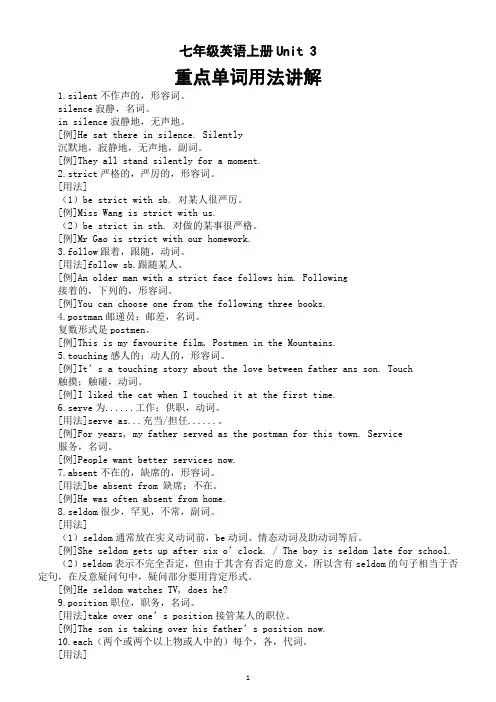
七年级英语上册Unit 3重点单词用法讲解1.silent不作声的,形容词。
silence寂静,名词。
in silence寂静地,无声地。
[例]He sat there in silence. Silently沉默地,寂静地,无声地,副词。
[例]They all stand silently for a moment.2.strict严格的,严厉的,形容词。
[用法](1)be strict with sb. 对某人很严厉。
[例]Miss Wang is strict with us.(2)be strict in sth. 对做的某事很严格。
[例]Mr Gao is strict with our homework.3.follow跟着,跟随,动词。
[用法]follow sb.跟随某人。
[例]An older man with a strict face follows him. Following接着的,下列的,形容词。
[例]You can choose one from the following three books.4.postman邮递员;邮差,名词。
复数形式是postmen。
[例]This is my favourite film, Postmen in the Mountains.5.touching感人的;动人的,形容词。
[例]It’s a touching story about the love between father ans son. Touch触摸;触碰,动词。
[例]I liked the cat when I touched it at the first time.6.serve为......工作;供职,动词。
[用法]serve as...充当/担任......。
[例]For years, my father served as the postman for this town. Service服务,名词。
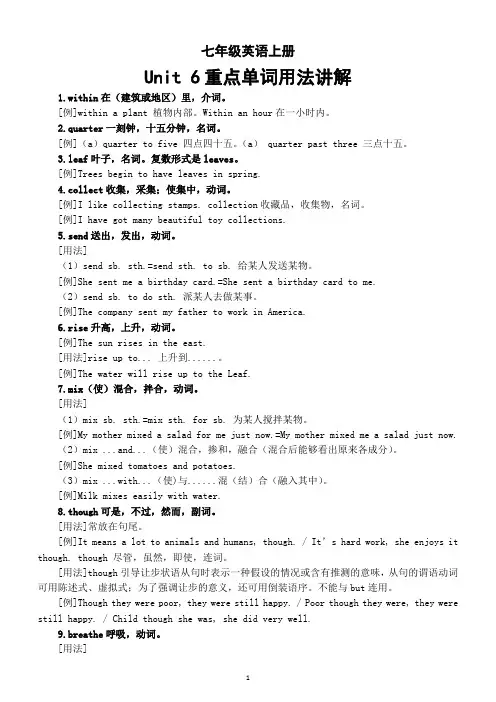
七年级英语上册Unit 6重点单词用法讲解1.within在(建筑或地区)里,介词。
[例]within a plant 植物内部。
Within an hour在一小时内。
2.quarter一刻钟,十五分钟,名词。
[例](a)quarter to five 四点四十五。
(a) quarter past three 三点十五。
3.leaf叶子,名词。
复数形式是leaves。
[例]Trees begin to have leaves in spring.4.collect收集,采集;使集中,动词。
[例]I like collecting stamps. collection收藏品,收集物,名词。
[例]I have got many beautiful toy collections.5.send送出,发出,动词。
[用法](1)send sb. sth.=send sth. to sb. 给某人发送某物。
[例]She sent me a birthday card.=She sent a birthday card to me.(2)send sb. to do sth. 派某人去做某事。
[例]The company sent my father to work in America.6.rise升高,上升,动词。
[例]The sun rises in the east.[用法]rise up to... 上升到......。
[例]The water will rise up to the Leaf.7.mix(使)混合,拌合,动词。
[用法](1)mix sb. sth.=mix sth. for sb. 为某人搅拌某物。
[例]My mother mixed a salad for me just now.=My mother mixed me a salad just now.(2)mix ...and...(使)混合,掺和,融合(混合后能够看出原来各成分)。
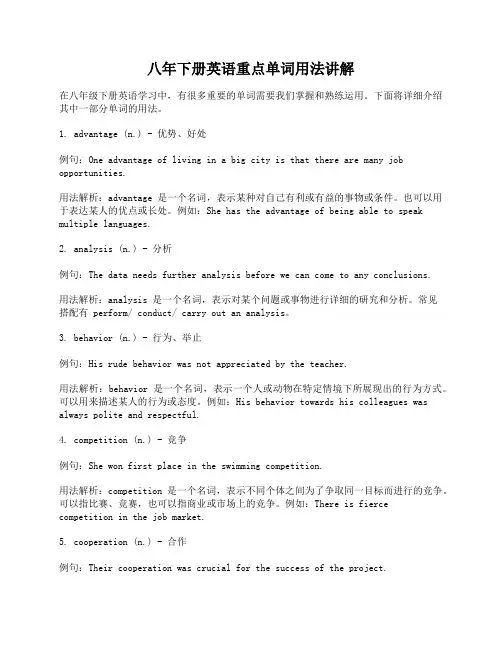
八年下册英语重点单词用法讲解在八年级下册英语学习中,有很多重要的单词需要我们掌握和熟练运用。
下面将详细介绍其中一部分单词的用法。
1. advantage (n.) - 优势、好处例句:One advantage of living in a big city is that there are many job opportunities.用法解析:advantage 是一个名词,表示某种对自己有利或有益的事物或条件。
也可以用于表达某人的优点或长处。
例如:She has the advantage of being able to speak multiple languages.2. analysis (n.) - 分析例句:The data needs further analysis before we can come to any conclusions.用法解析:analysis 是一个名词,表示对某个问题或事物进行详细的研究和分析。
常见搭配有 perform/ conduct/ carry out an analysis。
3. behavior (n.) - 行为、举止例句:His rude behavior was not appreciated by the teacher.用法解析:behavior 是一个名词,表示一个人或动物在特定情境下所展现出的行为方式。
可以用来描述某人的行为或态度。
例如:His behavior towards his colleagues was always polite and respectful.4. competition (n.) - 竞争例句:She won first place in the swimming competition.用法解析:competition 是一个名词,表示不同个体之间为了争取同一目标而进行的竞争。
可以指比赛、竞赛,也可以指商业或市场上的竞争。
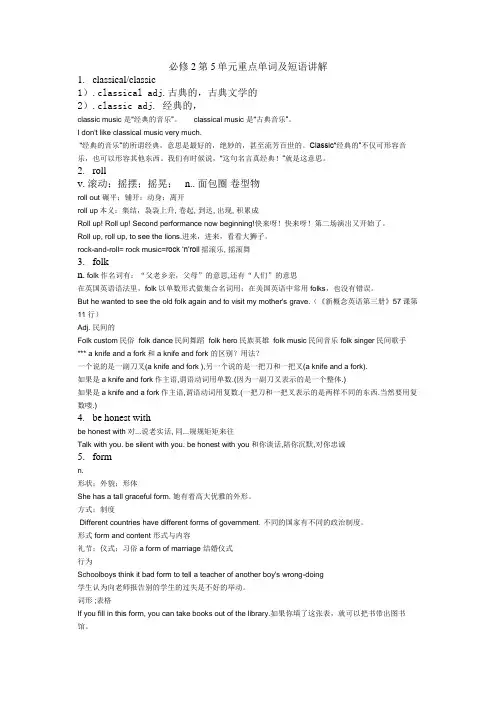
必修2第5单元重点单词及短语讲解1.classical/classic1).classical adj.古典的,古典文学的2).classic adj. 经典的,classic music 是“经典的音乐”。
classical music 是“古典音乐”。
I don't like classical music very much.“经典的音乐”的所谓经典,意思是最好的,绝妙的,甚至流芳百世的。
Classic“经典的”不仅可形容音乐,也可以形容其他东西。
我们有时候说,“这句名言真经典!”就是这意思。
2.rollv. 滚动;摇摆;摇晃; n.. 面包圈卷型物roll out 碾平;铺开;动身;离开roll up本义:集结,袅袅上升, 卷起, 到达, 出现, 积累成Roll up! Roll up! Second performance now beginning!快来呀!快来呀!第二场演出又开始了。
Roll up, roll up, to see the lions.进来,进来,看看大狮子。
rock-and-roll= rock music=rock ‘n’roll摇滚乐, 摇滚舞3.folkn. folk作名词有:“父老乡亲,父母”的意思,还有“人们”的意思在英国英语语法里,folk以单数形式做集合名词用;在美国英语中常用folks,也没有错误。
But he wanted to see the old folk again and to visit my mother's grave.(《新概念英语第三册》57课第11行)Adj. 民间的Folk custom民俗 folk dance民间舞蹈 folk hero民族英雄 folk music民间音乐 folk singer民间歌手*** a knife and a fork和 a knife and fork 的区别?用法?一个说的是一副刀叉(a knife and fork ),另一个说的是一把刀和一把叉(a knife and a fork).如果是a knife and fork作主语,谓语动词用单数.(因为一副刀叉表示的是一个整体.)如果是a knife and a fork作主语,谓语动词用复数.(一把刀和一把叉表示的是两样不同的东西.当然要用复数喽.)4.be honest withbe honest with对...说老实话, 同...规规矩矩来往Talk with you. be silent with you. be honest with you和你谈话,陪你沉默,对你忠诚5.formn.形状;外貌;形体She has a tall graceful form. 她有着高大优雅的外形。
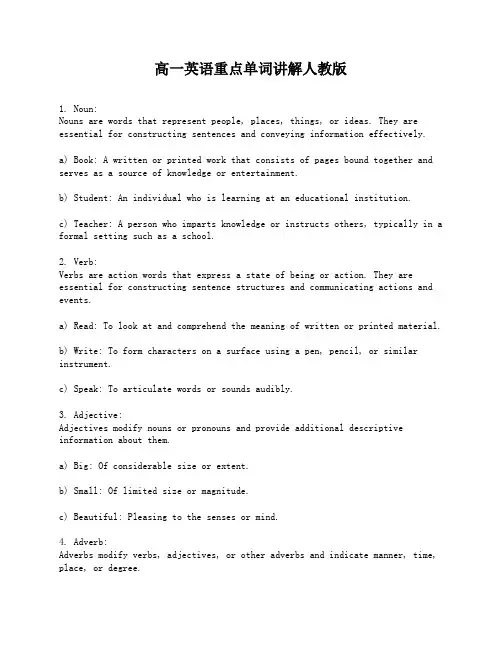
高一英语重点单词讲解人教版1. Noun:Nouns are words that represent people, places, things, or ideas. They are essential for constructing sentences and conveying information effectively.a) Book: A written or printed work that consists of pages bound together and serves as a source of knowledge or entertainment.b) Student: An individual who is learning at an educational institution.c) Teacher: A person who imparts knowledge or instructs others, typically in a formal setting such as a school.2. Verb:Verbs are action words that express a state of being or action. They are essential for constructing sentence structures and communicating actions and events.a) Read: To look at and comprehend the meaning of written or printed material.b) Write: To form characters on a surface using a pen, pencil, or similar instrument.c) Speak: To articulate words or sounds audibly.3. Adjective:Adjectives modify nouns or pronouns and provide additional descriptive information about them.a) Big: Of considerable size or extent.b) Small: Of limited size or magnitude.c) Beautiful: Pleasing to the senses or mind.4. Adverb:Adverbs modify verbs, adjectives, or other adverbs and indicate manner, time, place, or degree.a) Quickly: In a fast or rapid manner.b) Slowly: In a relaxed, unhurried manner.c) Carefully: With close attention or concern.5. Pronoun:Pronouns are words used to replace nouns, making sentences less repetitive.a) He: Used to refer to a male person or animal.b) She: Used to refer to a female person or animal.c) They: Used to refer to two or more people or things.6. Preposition:Prepositions show the relationship of a noun or pronoun to another word in the sentence.a) In: Expressing the situation of something or someone inside a space or area.b) On: Expressing the situation of something resting or supported by a surface.c) Under: Expressing the situation of something below or beneath.7. Conjunction:Conjunctions are words used to connect words, phrases, or clauses.a) And: Used to connect words or phrases that are similar or have related meanings.b) But: Used to connect words or phrases that express opposite or contrasting ideas.c) Or: Used to present alternatives or choices.8. Interjection:Interjections are words used to express strong emotions or sudden bursts of feeling.a) Wow: Used to express surprise or admiration.b) Oops: Used to acknowledge a mistake or accident.c) Ouch: Used to express sudden pain or discomfort.9. Determiner:Determiners are words that define or limit nouns in a sentence.a) The: Used to indicate specific nouns.b) An: Used before a word that begins with a vowel sound.c) Some: Used to indicate an indefinite amount or number.10. Exclamation:Exclamations are sentences that express strong emotions or reactions.a) "What a surprise!"b) "Congratulations on your success!"c) "What a pity!"11. Question:Questions are sentences that seek information or a response.a) "What time is it?"b) "Where is the nearest restaurant?"c) "How do you pronounce this word?"12. Imperative:Imperative sentences give commands, make requests, or offer advice.a) "Please pass the salt."b) "Do not enter."c) "Be quiet, everyone."13. Infinitive:The infinitive is the basic form of a verb, often preceded by "to."a) To learn: The action of acquiring knowledge or skill.b) To travel: The action of going from one place to another.c) To smile: The action of curving the lips upward in a pleased expression.14. Gerund:A gerund is a verb form that ends in -ing and functions as a noun.a) Reading: The activity of looking at and comprehending written material.b) Running: The activity of moving swiftly by foot.c) Cooking: The activity of preparing food by heating it.15. Participle:A participle is a verb form that can function as an adjective or a noun.a) Broken: Having been damaged and no longer in one piece.b) Fallen: Having dropped down from a higher position.c) Forgotten: Not remembered or recalled.16. Phrase:A phrase is a group of words that functions as a part of speech but does not contain a subject and verb.a) "At the moment": Indicating the current time or situation.b) "By the way": Introducing a tangent or additional information.c) "In my opinion": Expressing a personal belief or viewpoint.17. Clause:A clause is a group of words that contains a subject and a verb.a) "Because I was late": Giving a reason for an action.b) "If it rains": Expressing a condition for an event.c) "That she arrived safely": Providing additional information about a situation.18. Suffix:A suffix is a group of letters added to the end of a word to modify its meaning.a) "-ness": Used to form nouns that describe a state or quality, such as "happiness."b) "-ly": Used to form adverbs from adjectives, such as "quickly."c) "-ment": Used to form nouns from verbs, such as "enjoyment."19. Prefix:A prefix is a group of letters added to the beginning of a word to modify its meaning.a) "Un-": Used to form adjectives with a negative or opposite meaning, such as "unhappy."b) "Re-": Used to indicate an action being done again, such as "rewrite."c) "Pre-": Used to indicate precedence or prior action, such as "preheat."20. Homophone:Homophones are words that sound the same but have different meanings and often different spellings.a) "Sea" and "see": The former refers to the ocean, while the latter means to perceive with the eyes.b) "Flower" and "flour": The former refers to a plant's reproductive structure, while the latter is a powder made from grains.c) "There" and "their": The former indicates a place, while the latter is a possessive pronoun.21. Synonym:Synonyms are words that have similar meanings.a) "Happy" and "joyful": Both describe a feeling of pleasure or contentment.b) "Large" and "big": Both describe something of considerable size.c) "Quick" and "fast": Both describe something done with speed.22. Antonym:Antonyms are words that have opposite meanings.a) "Hot" and "cold": The former describes high temperature, while the latter describes low temperature.b) "Rich" and "poor": The former describes having wealth or abundance, while the latter describes a lack of resources.c) "Strong" and "weak": The former describes having power or resilience, while the latter describes a lack of strength.23. Idiom:An idiom is a group of words with a meaning that is different from the individual words.a) "Break a leg!": Used to wish someone good luck, especially in a performance.b) "Hit the books": Used to describe studying or reading intensively.c) "Let the cat out of the bag": Used to reveal a secret unintentionally.。
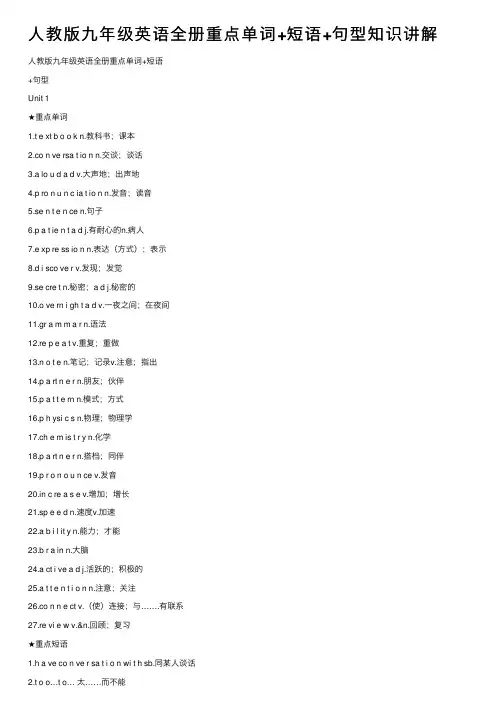
⼈教版九年级英语全册重点单词+短语+句型知识讲解⼈教版九年级英语全册重点单词+短语+句型Unit 1★重点单词1.t e xt b o o k n.教科书;课本2.co n ve rsa t io n n.交谈;谈话3.a lo u d a d v.⼤声地;出声地4.p ro n u n c ia t io n n.发⾳;读⾳5.se n t e n ce n.句⼦6.p a t ie n t a d j.有耐⼼的n.病⼈7.e xp re ss io n n.表达(⽅式);表⽰8.d i sco ve r v.发现;发觉9.se cre t n.秘密;a d j.秘密的10.o ve rn i gh t a d v.⼀夜之间;在夜间11.gr a m m a r n.语法12.re p e a t v.重复;重做13.n o t e n.笔记;记录v.注意;指出14.p a rt n e r n.朋友;伙伴15.p a t t e rn n.模式;⽅式16.p h ysi c s n.物理;物理学17.ch e m is t r y n.化学18.p a rt n e r n.搭档;同伴19.p r o n o u n ce v.发⾳20.in c re a s e v.增加;增长21.sp e e d n.速度v.加速22.a b i l it y n.能⼒;才能23.b r a in n.⼤脑24.a ct i ve a d j.活跃的;积极的25.a t t e n t i o n n.注意;关注26.co n n e ct v.(使)连接;与…….有联系27.re vi e w v.&n.回顾;复习★重点短语1.h a ve co n ve r sa t i o n wi t h sb.同某⼈谈话2.t o o…t o… 太……⽽不能3.t h e se cr e t t o… ……的秘诀4.b e a f r a id o f d o in g st h./b e a f ra id t od o st h.害怕做某事5.l o o k u p查阅6.r e p e a t o u t lo u d⼤声跟读7.m a ke m i st a k e s i n在……⽅⾯犯错误8.co n n e ct……wi t h… 把……和……连接/联系起来9.ge t b o re d感到厌烦10.b e st re sse d o u t焦虑不安的11.p a y a t t e n t io n t o注意;关注12.d e p e n d o n取决于;依靠13.t h e a b il it y t o d o st h..做某事的能⼒★重点句型1.提建议的句⼦:①W h a t/h o w a b o u t+d o in g st h?做……怎么样?如:W h a t/H o w a b o u t go in g sh o p p in g?②W h y d o n't yo u+d o st h?你为什么不做……?如:W h y d o n't yo u g o sh o p p in g?③W h y n o t+d o st h?为什么不做……?如:W h y n o t go sh o p p in g?④L e t's+d o st h.让我们做……吧。
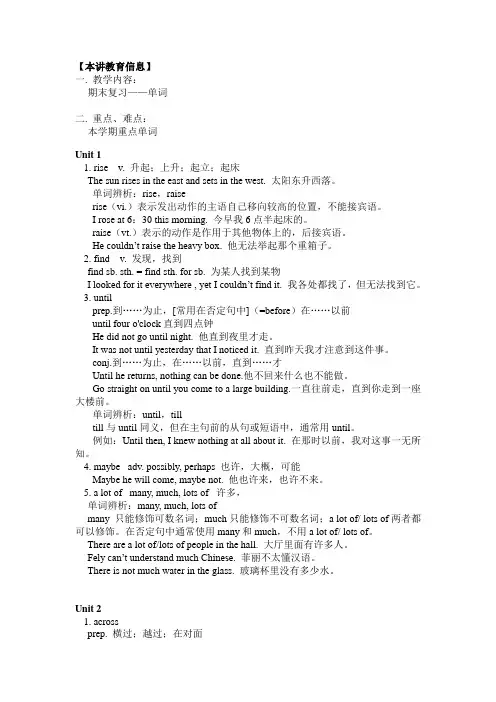
【本讲教育信息】一. 教学内容:期末复习——单词二. 重点、难点:本学期重点单词Unit 11. rise v. 升起;上升;起立;起床The sun rises in the east and sets in the west. 太阳东升西落。
单词辨析:rise,raiserise(vi.)表示发出动作的主语自己移向较高的位置,不能接宾语。
I rose at 6:30 this morning. 今早我6点半起床的。
raise(vt.)表示的动作是作用于其他物体上的,后接宾语。
He couldn‟t raise the heavy box. 他无法举起那个重箱子。
2. find v. 发现,找到find sb. sth. = find sth. for sb. 为某人找到某物I looked for it everywhere , yet I couldn‟t find it. 我各处都找了,但无法找到它。
3. untilprep.到……为止,[常用在否定句中](=before)在……以前until four o'clock直到四点钟He did not go until night. 他直到夜里才走。
It was not until yesterday that I noticed it. 直到昨天我才注意到这件事。
conj.到……为止,在……以前,直到……才Until he returns, nothing can be done.他不回来什么也不能做。
Go straight on until you come to a large building.一直往前走,直到你走到一座大楼前。
单词辨析:until,tilltill与until同义,但在主句前的从句或短语中,通常用until。
例如:Until then, I knew nothing at all about it. 在那时以前,我对这事一无所知。
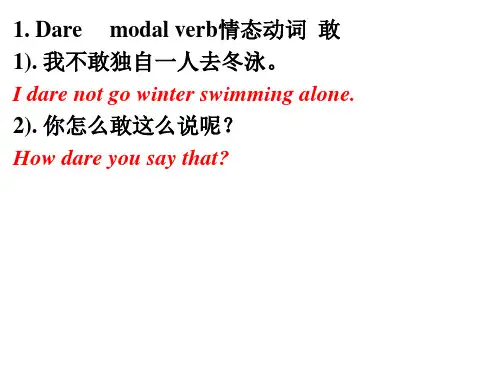
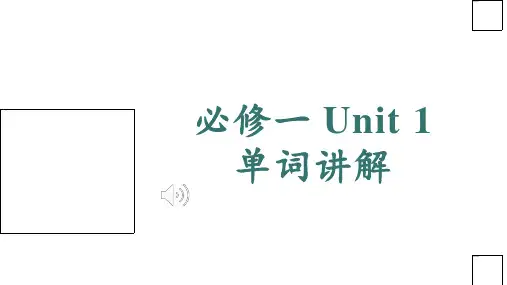
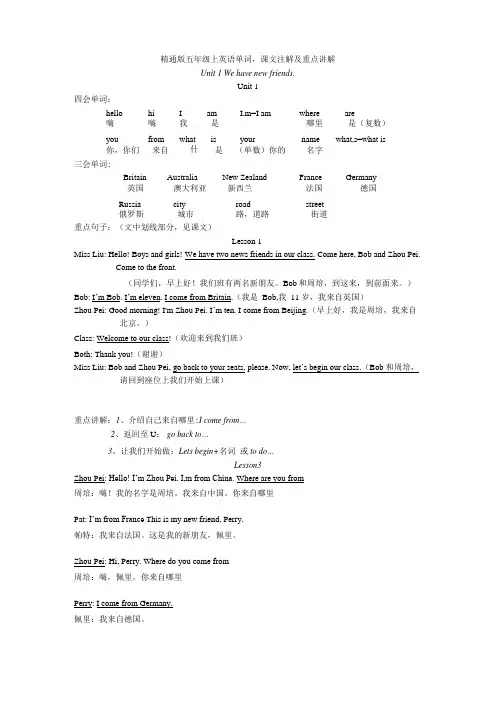
精通版五年级上英语单词,课文注解及重点讲解Unit 1 We have new friends.Unit 1四会单词:hello hi I am I,m=I am where are嗨嗨我是哪里是(复数)you from what is your name what,s=what is你,你们来自什么是(单数)你的名字三会单词:Britain Australia New Zealand France Germany英国澳大利亚新西兰法国德国Russia city road street俄罗斯城市路,道路街道重点句子:(文中划线部分,见课文)Lesson 1Miss Liu: Hello! Boys and girls! We have two news friends in our class. Come here, Bob and Zhou Pei.Come to the front.(同学们,早上好!我们班有两名新朋友。
Bob和周培,到这来,到前面来。
)Bob: I’m Bob. I’m eleven. I come from Britain.(我是Bob,我11 岁,我来自英国)Zhou Pei: Good morning! I'm Zhou Pei. I’m ten. I come from Beijing.(早上好,我是周培,我来自北京。
)Class: Welcome to our class!(欢迎来到我们班)Both: Thank you!(谢谢)Miss Liu: Bob and Zhou Pei, go back to your seats, please. Now, let’s begin our class.(Bob 和周培,请回到座位上我们开始上课)重点讲解:1、介绍自己来自哪里:I come from…2、返回至U:go back to…3、让我们开始做:Lets begin+名词或to do…Lesson3Zhou Pei: Hello! I’m Zhou Pei. I,m from China. Where are you from周培:嗨!我的名字是周培。
九年级英语五单元讲解人教版一、重点单词。
1. belong.- 词性:动词,意为“属于;归属”。
- 用法:belong to sb.,表示“属于某人”,这个短语没有被动语态,也没有进行时态。
例如:This book belongs to me.(这本书属于我。
)2. picnic.- 词性:名词/动词,作名词时意为“野餐”,作动词时意为“去野餐”。
- 例如:We had a picnic in the park last Sunday.(上星期天我们在公园野餐了。
)Let's picnic on the beach.(让我们在海滩上野餐吧。
)3. possibly.- 词性:副词,意为“可能地;也许”。
- 例如:It will possibly rain tomorrow.(明天可能会下雨。
)4. drop.- 词性:动词,有多种含义,如“使落下;掉下;(使)降低;(使)减少”等。
- 例如:He dropped his pen on the floor.(他把笔掉在地板上了。
)The temperature dropped suddenly.(温度突然下降了。
)5. count.- 词性:动词,意为“计数;计算;有价值;重要”。
- 例如:Can you count from 1 to 100?(你能从1数到100吗?)Every second counts.(每一秒都很重要。
)6. final.- 词性:形容词,意为“最后的;最终的”。
- 例如:This is the final decision.(这是最后的决定。
)7. anxious.- 词性:形容词,意为“焦虑的;担忧的”。
- 例如:She is anxious about her son's safety.(她担心她儿子的安全。
)8. owner.- 词性:名词,意为“物主;所有者”。
- 例如:The owner of the house is very kind.(房子的主人很友善。
七年级英语上册重点单词用法讲解Starter1.ready准备好(做某事)的,形容词。
用法:(1)be / get ready to do sth.准备做某事。
如,I'm ready to play football with my friends.(2)be /get ready for sth. 为某事准备好;为......做好准备。
如,She's ready for the Spring Festival.(3)be ready to do sth.乐意做某事。
如,He’s ready to help others.(4)be ready准备好了。
如,Dinner is ready, Sam.2.join参与,加入(某项活动),动词。
用法:如,join后接人或组织。
如,Do you want to join the Music Club? / I want to join them now.3.introduce介绍,动词。
用法:(1)introduce myself 自我介绍。
如,I introduce myself first.(2)introduce...to ...把......介绍给......。
如,Now I introduce Lucy to you.4.yourself你自己;你们自己,代词(反身代词)。
反身代词构成规律:第一、二人称的反身代词由形容词性物主代词+self(单数)或selves(复数)。
如,myself, yourself, ourselves, yourselves。
第三人称的反身代词是宾格+self(单数)或selves(复数)。
如,himself,herself,itself,themselves。
5.enjoy喜欢;享受......的乐趣,动词。
用法:enjoy sth./enjoy doing sth. 喜欢某物或喜欢做某事。
如,She enjoys reading books every morning.6.nervous神经紧张的;焦虑不安的,形容词。
必修3第4单元重点单词和短语讲解1.solar adj.太阳的,日光的solar system太阳系solar power 太阳能; 太阳能动力Somewomen now can use solarpower instead of gas stoves to boil water and cook food. 现在一些妇女使用太阳能代替煤气炉烧水做饭。
solar atmosphere and solar activities 太阳大气和太阳活动lunar阴历的, 月的lunar calendar阴历2.violent激烈的; 猛烈的; 强烈的;暴力的A shark is a kind of violent fish鲨鱼是一种有攻击性的鱼类.why do French has violent revolutions to bring about change?为什么法国靠暴力革命去寻求改变?1.The boat which was full of petrol sank in a ___ storm at sea.A. violateB. violenceC. violentD. violated选C violent :激烈的;猛烈的;强烈的意思The boat which was full of petrol sank in a violent storm at sea.柴油充足的船在海上强烈的风暴中沉没了。
violate vt.1. 违犯;违背2. 侵犯;扰乱3. 亵渎;污损violence 是名词,暴力。
violated 是violate 的过去时。
3.explodeexplode: “迅速增长”;“发怒” 爆发;爆炸。
The population of this city has exploded in the last / past few years. 在最近几年里这个城市的人口急剧增加(explode)如果是“someone explodes”则是“发怒”的含义了。
必修4第5单元重点单词及短语讲解1.themetheme []n.[C]1. 论题,话题,题目The main theme of discussion was press censorship.讨论的主题是新闻审查制度。
2. 主题,主题思想;题材The theme of the poem is love and peace.这首诗的主题是爱与和平。
3. (学生的)作文,文章Our school themes(compositions)must be written in ink and on white paper.我们学校的作文要用墨水写在白纸上。
4. 【音】主题曲Bruce Lee Theme 小龙传奇主题曲2.amuseamuse []vt.1. 使欢乐,逗...高兴;使发笑;[(+at/by/with)]A clown's job is to amuse the spectators. 小丑的工作就是娱乐观众。
2. 给...提供娱乐,消遣It was too rainy to play outside, so she amused herself with a book.雨大,不适合在外面玩,所以她看书消遣。
He amused himself by playing the flute. 他吹笛自娱。
Amuse & entertain的辨析:The joke____ the audience so much that the laughter lasted as long as 5minutes.A. interestedB. amusedC. entertainedD. movedamuse强调把人逗乐,通俗点说就是“搞笑”,强调搞笑的效果。
entertain强调笼统的娱乐,是相对于工作学习而言的To my _____,he fell down on the ground.(amuse)To our _____ (amuse),the actor fell off the stage.amusementamuse是动词,amusing 是形容词,此处应该是名词。
矿产资源开发利用方案编写内容要求及审查大纲
矿产资源开发利用方案编写内容要求及《矿产资源开发利用方案》审查大纲一、概述
㈠矿区位置、隶属关系和企业性质。
如为改扩建矿山, 应说明矿山现状、
特点及存在的主要问题。
㈡编制依据
(1简述项目前期工作进展情况及与有关方面对项目的意向性协议情况。
(2 列出开发利用方案编制所依据的主要基础性资料的名称。
如经储量管理部门认定的矿区地质勘探报告、选矿试验报告、加工利用试验报告、工程地质初评资料、矿区水文资料和供水资料等。
对改、扩建矿山应有生产实际资料, 如矿山总平面现状图、矿床开拓系统图、采场现状图和主要采选设备清单等。
二、矿产品需求现状和预测
㈠该矿产在国内需求情况和市场供应情况
1、矿产品现状及加工利用趋向。
2、国内近、远期的需求量及主要销向预测。
㈡产品价格分析
1、国内矿产品价格现状。
2、矿产品价格稳定性及变化趋势。
三、矿产资源概况
㈠矿区总体概况
1、矿区总体规划情况。
2、矿区矿产资源概况。
3、该设计与矿区总体开发的关系。
㈡该设计项目的资源概况
1、矿床地质及构造特征。
2、矿床开采技术条件及水文地质条件。